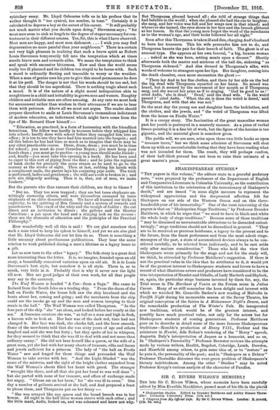SHAKESPEAREAN STUDIES.* " THE papers in this volume," the editors
state in a graceful prefatory note,. " were prepared by the professors of the Department of English and Comparative Literature in Columbia University, as the contribution of this institution to the celebration of the tercentenary of Shakspere's death," and are issued " in some slight measure to represent the widespread appreciation and the deepseated affection felt for Shakspere on our side of the Western Ocean and on this three- hundredth year of his immortality." One of the most interesting of the papers is that on " Shaksperian Stage Traditions," by Professor Brander Matthews, in which he urges that " we need to have in black-and-white the whole body of stage-traditions." Because some of these traditions " may be dismissed as unwarrantable obtrusions to be discarded unhesi- tatingly," stage traditions should not be discredited in general. " They are to be received as precious heirlooms, a legacy to the present and to the future, from the finest performers and from the most adroit stage- managers of the past, a store of accumulated devices always to be con- sidered carefully, to be selected from judiciously, and to be east aside only after mature consideration." Those who hold the view that Shakespeare wrote primarily for the stage and not for the study will, we think, be attracted by Professor Matthews's suggestion. If there is not the practical value in the idea that he attributes to it, it would yet be of the greatest interest to Shakespeare students and lovers to have a record of what illustrious actors and producers have considered to be the true interpretation of Hamlet and Othello, of Lady Macbeth and Shylock, or, again, the particular stage business invented by them for, say, the Trial scene in The Merchant of Venice or the Forum scene in Julius Caesar. Many of us still remember the keen delight and interest with which we watched Mr. Granville Barker's new reading of Malvolio in Twelfth Night during his memorable season at the Savoy Theatre, his original conception of the fairies in A Midsummer Night's Dream, and the remarkable production of The Winter's Tale. He inaugurated now traditions, which would be of the greatest interest, and possibly have much practical value, not only for the actors but for Shakespeare students of coming generations. Professor Matthews goes on to describe in detail some of the more famous Shakespearean traditions—Kemble's production of Henry V111., Fechter and the miniature in Hamlet, Ada Rehan's rendering of the " Mercy " speech, Augustin Daly's interpretation of Jaques as a humorist, and so on In " Shakspere's Personality " Professor Brewster reviews the attempts made by various writers, Hazlitt, Bagehot, Coleridge, Lamb, Dowden, and Masefield among others, to gain some idea of, or to "restore" as he puts it, the personality of the poet; and in "Shakspere as a Debtor" Professor Thorndike discusses the ever-green problem of Shakespeare's literary indebtedness. Among the other " Studies " may be noted Professor Krapp's curious analysis of the character of Parolles.


































 Previous page
Previous page